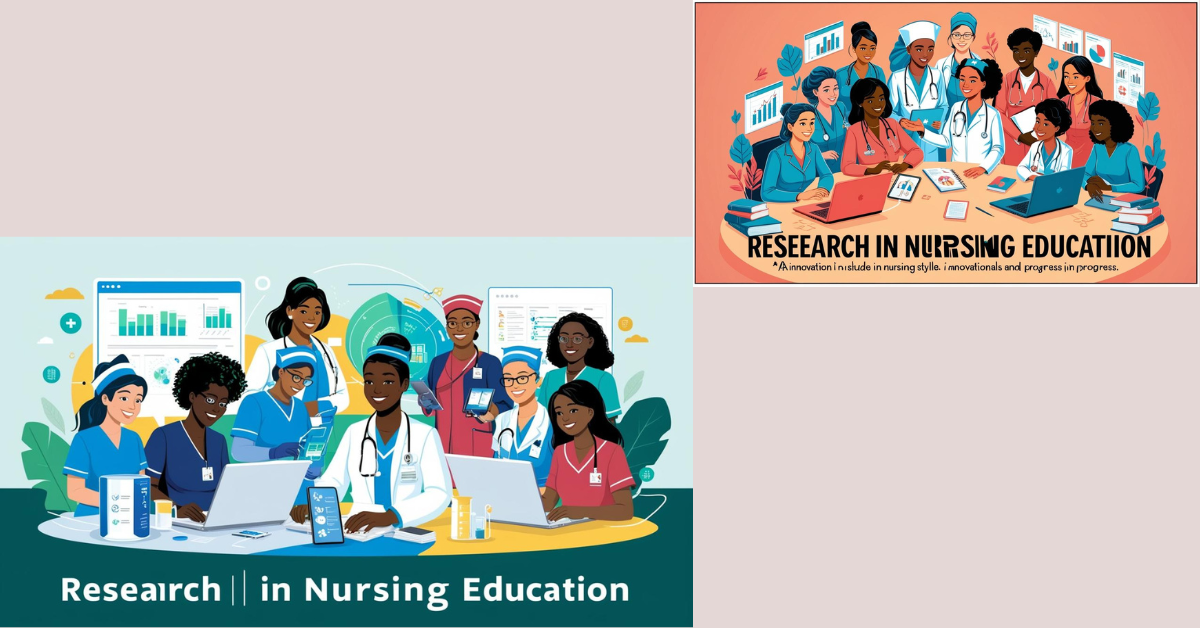In the nursing profession Research in Nursing Education Advancing the Future of Healthcare is a main focus for both educators and researcher. the educators want to explore the deficiencies in their current educational activities and want to explore them. While researcher also want some areas of research rather than clinical setting to explore the techniques at educational level bring better results in clinical outcome by implementing them in educational system.
Advancing the Future of Healthcare: Research in Nursing Education
In the healthcare system nursing education is a crucial part, because it equips future nurses with knowledge, skills, and professional competencies. These are needed for safe and effective patient care along with better outcomes. Nursing educational research serves as the foundation of improvement and innovation for teaching methods, curriculum, and student learning outcomes. It helpful for the identification of gaps, challenges, and opportunities within nursing education along with contribution for the shaping the future of healthcare for nursing side.
Importance of Research in Nursing Education
Research is crucial for nursing education. It provides a scientific foundation for practice, enabling nurses to deliver evidence-based, high-quality care and stay updated, ultimately improving patient care outcomes.
Nursing educational Research is essential for several reasons some or them are discussed below:
Improving Educational Outcomes
Using research, educators can identify effective teaching strategies, learning methods, and evolutional tools in healthcare setting. It also enhances student learning along with outcomes and clinical competency in practices.
Curriculum Development
Curriculum of Nursing must develop to keep pace with the changing healthcare landscape in this this emerging era. Recent research proves that educational content remains relevant and that students are adequately prepared for updated clinical practice.
Evidence-Based Education
Clinical practice is driven by evidence-based care, nursing education should be informed by research-based strategies in health care education. It is necessary to ensure that future nurses are receiving the best possible education as their requirement.
Bridging the Theory-Practice Gap
Research might be helpful for the disconnect between classroom learning and real-world nursing practice. It provides insights into how best to integrate theory and clinical skills for nursing students.
Enhancing Critical Thinking and Problem-Solving
Promoting critical thinking is a crucial skill for nurses to make informed decisions in complex clinical environments, it is also focusing research to develop such methods for the promotion of critical thinking.
Key Areas of Research in Nursing Education
In nursing education research explore the following are Key focus areas of research:
Improving patient outcomes
Enhancing nursing practice
Preparing future nurses for diverse healthcare settings
It also focuses on evidence-based practice and addressing health disparities.
Pedagogical Approaches
The focus of Research in pedagogy is on how nursing students learn best and which teaching methods are most effective for them along with outcomes. Traditional lectures, flipped classrooms, online learning, and simulation-based education are also included in these methods.
Other active learning strategies encourage students to engage with content critically rather than passively absorbing information. Nursing studies have explored the benefits of interactive learning and problem-based learning (PBL) in nursing education.
Simulation in Nursing Education
Use of high-fidelity simulations have become a popular tool in nursing education. It also provides students with a safe, controlled environment in which to practice clinical skills by on hands practices.
It is investigation how simulation affects skill acquisition, critical thinking, decision-making, and confidence in real-life scenarios by research. These research studies also evaluate how different types of simulation and debriefing sessions contribute to learning outcomes of students.
Online and Distance Learning
Rise of technology has promoted online nursing programs and distance learning have gained popularity now a days. The effectiveness of online education compared to traditional classroom-based learning has been examined by research.
Student engagement, interaction with instructors and peers are the Key research areas, along with learning outcomes, and the challenges of providing clinical experience in an online educational planning.
Assessment and Evaluation Methods
These skills are vital for ensuring competence in nursing graduates for Accurate and fair assessment of student knowledge and expertise. Research in this area focuses on developing and validating assessment tools.
Alternative methods of assessment are the sake of interest for researchers. The peer and self-assessments that can provide students with greater insight into their learning progress are the part of emerging researchers.
Inter-professional Education
Students from different healthcare professions learn together in inter-professional education. It acts like a tool to foster collaboration and teamwork in patient care. Research studies explore how Inter-Professional Education impacts nursing students’ communication, collaboration, and leadership skills while working with healthcare teams. Long-term outcomes of Inter-Professional Education in improving patient care quality along with reduction in medical errors.
Mentorship and Preceptorship
Both mentorship and preceptorship programs are key components of nursing education. They are also helpful for students’ transition from theoretical knowledge to clinical practice in their education tenure. How these programs affect student learning, retention, job satisfaction, and readiness for practice is explored by research.
Research outcomes also investigate the qualities of effective mentors and preceptors, the role of feedback, and the challenges faced in clinical placements by these preceptors and mentors.
Cultural Competence in Nursing Education
It is an essential skill for nurses in a progressive and diverse healthcare environment for health professionals. Its purpose is to explore how nursing education can better integrate with cultural sensitivity and competence into the current curriculum.
It is assessed in these studies how teaching cultural competence affects student attitudes and abilities to provide care to patients from diverse backgrounds and pre-existing knowledge.
Resilience and Well-Being of Nursing Students
Both academically and emotionally grooming is the demand of nursing education. Promotion of student well-being and resilience, looking at factors such as stress management, coping strategies, and support systems are the focus of research exploration. Research is helpful for students navigating the challenges of nursing school to investigate the effectiveness of mindfulness training.
Methodologies Used in Nursing Education Research
In nursing education, we use a variety of qualitative and quantitative methods. The purpose is to explore issues and develop evidence-based solutions that are explored by research.
Common research methodologies include given below in detail:
Qualitative Research
It is a method of exploring that focuses on understanding the “why” and “how” of phenomena in the actual world. There is non-numerical data, such as interviews, observations, and focus groups. These tools gain insights into social realities, attitudes, and behaviors or research participants. Some types are discussed below.
Interviews and Focus Groups
In-depth insights into participant (student and faculty) experiences are gained. Qualitative research often involves structured interviews of individual and focus groups. All such methods provide rich, narrative data that can help identify themes and patterns in the educational environment.
Case Studies
Detailed examinations of specific educational practices or interventions can provide valuable insights. It also explores their effectiveness and application.
Quantitative Research
It is a structured approach that uses numerical data and statistical analysis. It is helpful to quantify variables, identify patterns, and generalizations regarding population that aim to establish objective and measurable results about interest of researchers.
Surveys and Questionnaires
Both tools are often used to collect data regarding student satisfaction, learning outcomes, and perceptions of specific educational methods.
Randomized Controlled Trials
RCTs are conducted to compare the effectiveness of different teaching interventions, are recommended in some cases. This provides high-quality evidence for best practices.
Mixed-Methods Research
Sometime studies use a combination of qualitative and quantitative methods to provide a more comprehensive understanding of educational issues with both approaches. A study might use quantitative surveys to measure learning outcomes and qualitative interviews to explore students’ experiences regarding a particular teaching method in their educational setup.
For Detail Reading: https://nurseseducator.com/types-or-kinds-of-research/
Challenges in Nursing Education Research
These challenges in nursing education research include:
Shortage of nurse educators
Keeping up with technological advancements
Ineffective clinical education
Lack of preceptors
Addressing cultural diversity in nursing education and clinical learning environments
Funding and Resources
The time limitation, funding, and access to resources are required to conduct research, all of that is limited in nursing education programs. Institutional support for educational research can be a challenge in the research process.
Ethical Considerations
When educators are also researchers, research involving students as participants must carefully consider issues of consent, confidentiality, and potential conflicts of interest for fare results.
Keeping Pace with Rapid Changes
Now the healthcare landscape and educational technologies are constantly evolving. So, as a result, nursing education research must keep up with these changes to remain purposive, relevant and impactful.
Diverse Learning Needs
Nursing students belong to a variety of educational, ethnic and cultural backgrounds. So, the nursing educational research must focus for these differences when evaluating the effectiveness of teaching strategies and methods currently in the educational system.
Future Directions for Research in Nursing Education
Nursing education should focus on integrating technology, addressing health equity, promoting nurse well-being, and strengthening evidence-based that is also focus of nursing education today. Some of the future directions are given below:
Technology Integration
Healthcare and education have become increasingly digitized, research will continue to explore. Its focus is to identify new technologies such as artificial intelligence, virtual reality, and mobile apps. All of the above mentioned can be used to enhance nursing education and promote research as well.
Global Collaboration
As global health challenges rise, research in nursing education will likely focus on how to prepare nurses for international work. It includes developing a curriculum for the promotion of cultural competence and global health awareness for nursing professions.
Longitudinal Study
Long-term studies that follow nursing students from education into clinical practice are needed to assess how well educational programs are making them ready for real-world nursing roles and functions.
Competency-Based Education
Research now a day continue to explore the shift from time-based to competency-based education models. It focuses on how best to assess student competencies and ensure that nursing graduates are ready for their practice in professional life.
Conclusion
There is a vital role of research in nursing education for shaping the future of the nursing profession and solution of future problems. The evidence needed to improve teaching methods, curriculum design, and student outcomes are explored. It also ensures that nursing students are well-prepared to meet the demands of modern healthcare in future. Simulation, online learning, assessment methods, and -education are the key research focus areas. The researchers can play their role for the ongoing development of nursing education and ultimately improve patient care and outcomes of care.
Read More:
https://nurseseducator.com/high-fidelity-simulation-use-in-nursing-education/
First NCLEX Exam Center In Pakistan From Lahore (Mall of Lahore) to the Global Nursing
Categories of Journals: W, X, Y and Z Category Journal In Nursing Education
AI in Healthcare Content Creation: A Double-Edged Sword and Scary
Social Links:
https://www.facebook.com/nurseseducator/
https://www.instagram.com/nurseseducator/

